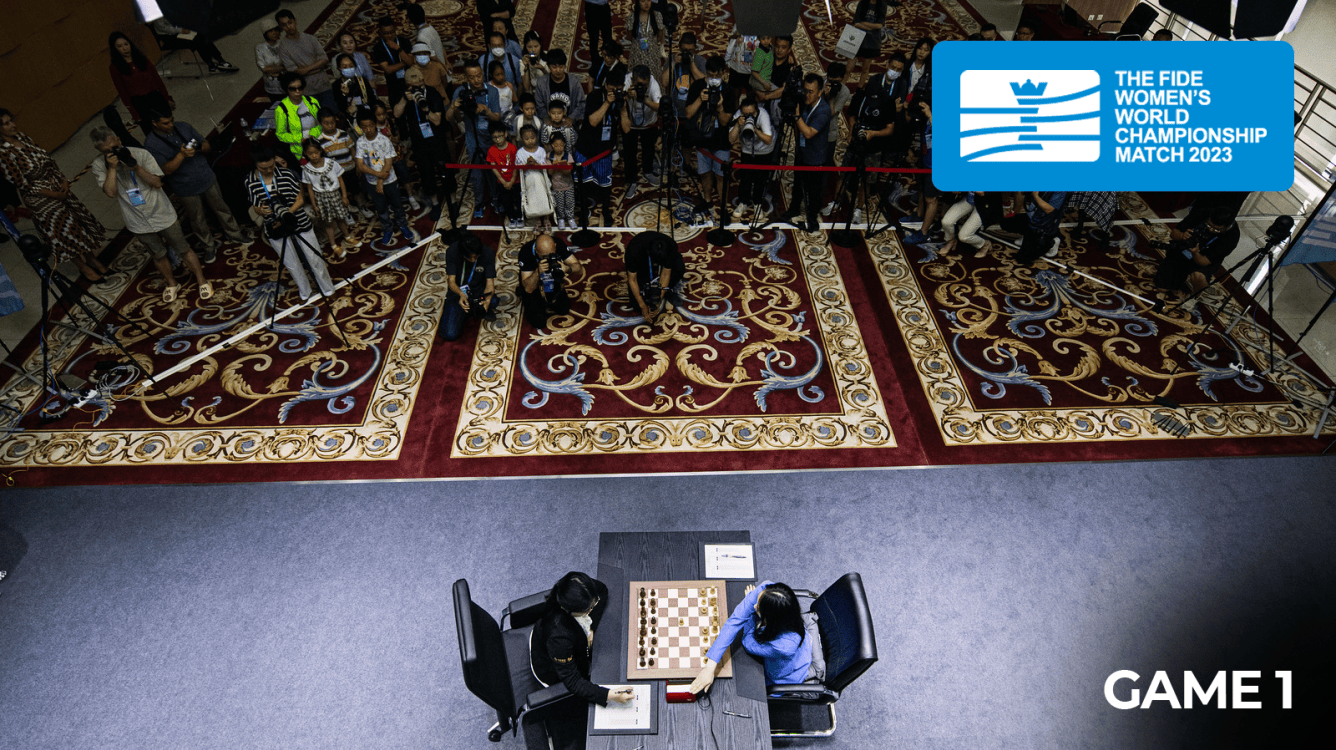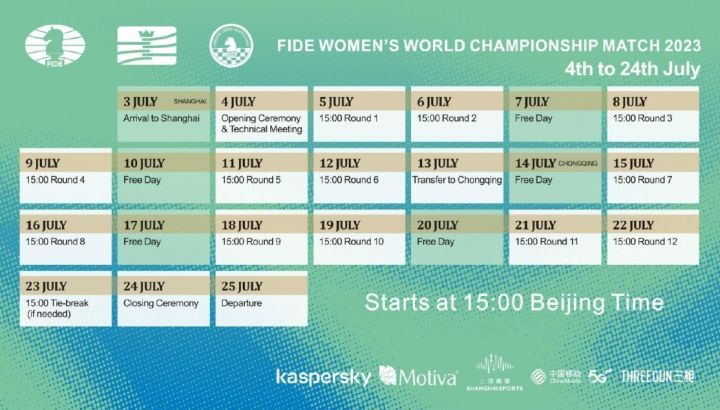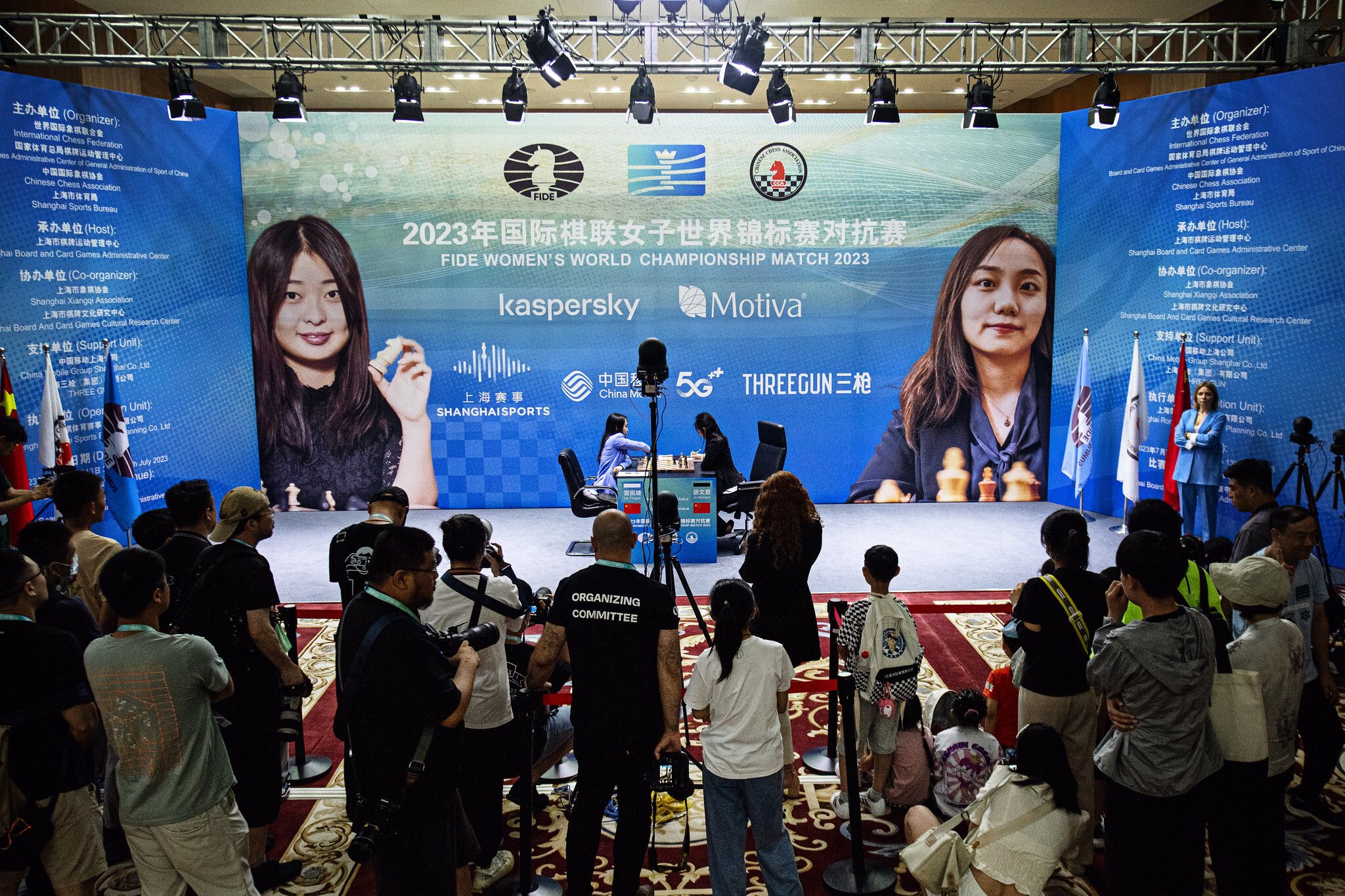
FIDE Women's World Championship Match Starts With Fighting Draw In Shanghai
Women's World Champion Ju Wenjun had to fight hard to hold a draw in game one of the 2023 FIDE Women's World Championship Match after challenger GM Lei Tingjie opened with an aggressive pawn sacrifice in her first-ever match at the very highest level.
Game two, when Ju will have the white pieces, starts on Thursday, July 6, at 3:00 a.m. ET / 09:00 CEST.
Before getting to game one of the 2023 Women's World Championship Match, let's take a look at how the players got there.
- The Road To The 2023 Women's World Championship: Ju Wenjun
- The Road To The 2023 Women's World Championship: Lei Tingjie
- The 2023 Women's World Championship Format
- Pre-Match Build-Up, Controversy
- Game 1: Lei Tingjie 1/2-1/2 Ju Wenjun

The Road To The 2023 Women's World Championship: Ju Wenjun
Ju became the 17th women's world chess champion in 2018 when, at the age of 27, she defeated her compatriot GM Tan Zhongyi 5.5-4.5 in a 10-game match. That match went the full distance, but Ju's route to becoming the sixth world champion from China was smooth, as she never trailed.
What came next was heroic. Just six months later, Ju managed to mirror the feat of GM Xie Jun in 2000 by defending her title in a 64-player knockout. Ju came from behind in the final to defeat GM Kateryna Lagno 5:3 and retain her title. It was an incredible year for Ju, who also won individual and team gold with China at the 2018 World Chess Olympiad.

Ju became a three-time world champion in 2020, when she defeated GM Aleksandra Goryachkina in a topsy-turvy 12-game match, where Ju led twice and Goryachkina once, before the Chinese grandmaster eventually prevailed 2.5-1.5 in tiebreaks. Ju has remained the world champion ever since and is looking to extend her five-year reign. She commented at the opening press conference:
"I feel very excited and I have passion for the next three weeks. Also, it’s been a long time since the last women’s world championship match, and I think it will be a very exciting tournament."
The Road To The 2023 Women's World Championship: Lei Tingjie
Lei is six years Ju's junior, and her recent rise has been meteoric. She qualified for the Women's Candidates, the gateway to a match, by winning the 2021 FIDE Grand Swiss with a stunning unbeaten 9/11, finishing 1.5 points clear of her nearest rivals.

Then she went through the Candidates matches like a steamroller, not losing a game as she beat GMs Mariya Muzychuk and her sister Anna Muzychuk. She did lose the first game of the final, to Tan, but then she stormed back to win three games and cruise into her first world championship match. "I am the challenger, so I don't feel any pressure!" Lei said in the opening press conference, adding of her friendship with Ju:
"We have a good relationship off the board, but chess is a sport, and sport is quite cruel, because the winner is only one person. I’m here and I’m ready to fight, so after the match I think we can be also good friends!"
The 2023 Women's World Championship Format
As in 2020, the Women's World Championship is a 12-game match split between two cities, in this case Ju's home city of Shanghai for the first six games, before the action moves to Lei's home city of Chongqing for the remainder of the match.
The time control is the FIDE standard 90 minutes for 40 moves, followed by 30 minutes to the end of the game, with a 30-second increment from move one—curiously a very different time control from the very long one employed for the overall world championship title.

The first player to reach 6.5 points wins, and gets €300,000 (about $325,000) to the loser's €200,000, while if the match goes to tiebreaks the prize fund is split €275,000/225,000. The tiebreaks consist of four 25+10 rapid games, followed, if needed, by up to two pairs of 5+3 blitz games and then single 3+2 blitz games until a winner is decided.
Pre-Match Build-Up, Controversy
A women's world championship between two Chinese players, taking place in China at an inconvenient time, for instance, for U.S. chess fans, is a potentially hard sell, and there has been some controversy in the run-up to the match. GM Maurice Ashley pointed out that the prize fund is one quarter of the prize fund for the last world chess championship match we witnessed.
The prize fund for the upcoming Women’s World Ch match is €500K, a quarter of the €2M of Nepo vs. Ding. How would you feel if you are a little girl who dreams of becoming a chess pro and you see these numbers? I applaud all the amazing women who continue to represent our game. pic.twitter.com/NcPqdEoPiE
— Maurice Ashley (@MauriceAshley) June 29, 2023
Many noted that women are also able to compete for the overall world championship—GM Judit Polgar did just that when she played in the eight-player 2005 FIDE World Chess Championship—though other sports have moved towards equal prize money.

Arguably the most dismissive take on the match, however, came from what should have been the least likely source—the CEO of FIDE, GM Emil Sutovsky, who posted a poll on his private Twitter. It was all about the 4th option he highlighted, which was widely criticized.
That is an interesting question, considering that they have not even setup a homepage for the event THAT STARTS TOMORROW pic.twitter.com/UHFcOdGynw
— Paul Meyer-Dunker (@Meyer_Dunker) July 4, 2023
You should, as the CEO of FIDE, understand the damage you do by implying many people simply won't care about the match - if nothing else, you have to grasp the bad optics of disparaging a match you're organising yourself
— MrDodgy (FIDE Ethics Examiner) (@ChessProblem) July 4, 2023
The official website for the event did finally appear, weeks after it would have been useful for promotion, but despite being generally well-designed, it managed to strike a wrong note again by stressing the appearance of the players rather than their chess.

Luckily most of the pre-match build-up will be forgotten, however, as the chess action begins. The players are teammates and friends, but not, it's already clear, at the chessboard.
The tension is palpable between these fierce rivals. pic.twitter.com/tWd3IGELRH
— David Llada ♞ (@davidllada) July 1, 2023
Game 1: Lei Tingjie ½-½ Ju Wenjun

Lei had the white pieces for her first world championship game and sprung a small surprise by playing 1.e4 and the Ruy Lopez, inviting Ju to play her trusty Berlin Defense.
The first moves of the 12-game 2023 Women's World Championship match between Challenger Lei Tingjie and Defending Champion Ju Wenjun! pic.twitter.com/IE3EiAAFGG
— chess24.com (@chess24com) July 5, 2023
Were we in for a boring draw? Not at all! It turned out Lei had come to the board prepared to play a pawn sacrifice that had allowed Dutch GM and opening expert Jorden van Foreest to crush GM Alireza Firouzja a year ago in Croatia. Ju initially reacted slowly, though her first new move of the game, 15...d5, seemed a decent try, and there was no immediate kill.
Kosteniuk: "In this modern chess those lines happen pretty often when one side just sacrifices a pawn, not for some concrete reasons, not to win with a brilliant combination, but in a positional way. Ok, we're a pawn down, but we continue to play as if nothing happened" pic.twitter.com/uZFKgTaGB6
— chess24.com (@chess24com) July 5, 2023
In fact, at first it seemed that when Ju gave back a pawn to swap off queens the danger had gone, but not for long, as Lei threatened to suffocate the black pieces with a kingside pawn storm. Ju reacted aggressively with 28...f5!?
It was a move that could have been punished by the immediate 29.Bb4, threatening the defender of the black bishop, but in the end things worked out for Ju. After making the time control with little time to spare she managed to steer the game towards a safe draw in a rook endgame.
GM Rafael Leitao has annotated the game below.

That means Ju has the slight advantage of now having the white pieces for more of the remaining games, but with 11 games ahead, it's far too early to talk about the players' chances.
| Fed | Name | Rtg | 01 | 02 | 03 | 04 | 05 | 06 | 07 | 08 | 09 | 10 | 11 | 12 | Score |
| Ju Wenjun | 2564 | ½ | 0.5 | ||||||||||||
| Lei Tingjie | 2554 | ½ | 0.5 |
The 2023 FIDE Women's World Championship (FWWC) is the most important women's over-the-board event of the year. The defending women's world champion GM Ju Wenjun faces the challenger GM Lei Tingjie to see who will be crowned world champion. The championship starts on July 5 and boasts a €500,000 prize fund.
Previous Coverage


